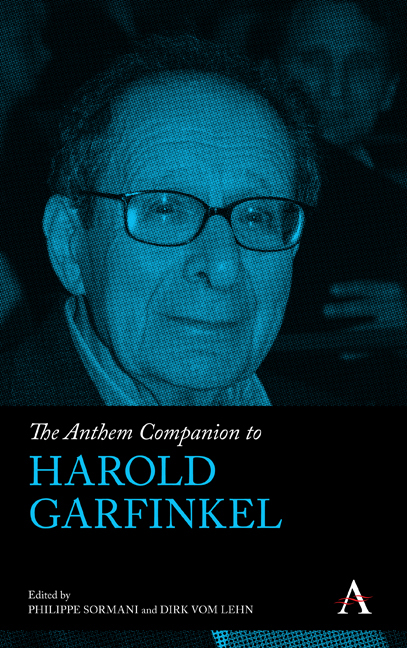Book contents
- Frontmatter
- Contents
- List of Illustrations
- Introduction: Rediscovering Garfinkel's “Experiments,” Renewing Ethnomethodological Inquiry
- Part I Exegesis
- Part II ‘Experiments’
- Part III Implications
- Postface: “Experiments”—What are we Talking About? A Plea for Conceptual Investigations
- Notes on Contributors
- Index of Names
- Index of Subjects
Chapter Two - The Continuity of Garfinkel's Approach: Seeking Ways of “Making the Phenomenon Available Again” Through the Experience and Usefulness of “Trouble”
Published online by Cambridge University Press: 28 February 2024
- Frontmatter
- Contents
- List of Illustrations
- Introduction: Rediscovering Garfinkel's “Experiments,” Renewing Ethnomethodological Inquiry
- Part I Exegesis
- Part II ‘Experiments’
- Part III Implications
- Postface: “Experiments”—What are we Talking About? A Plea for Conceptual Investigations
- Notes on Contributors
- Index of Names
- Index of Subjects
Summary
Introduction
One of the more serious challenges confronting social research is that the social practices used to create stable social order and meaning—the social facts that are sociology's fundamental object—are usually taken for granted: their use does not require conscious awareness or consideration. In addressing this obstacle, Garfinkel noted that social practices can quickly become routine, making the social world appear to be just out there, ready to hand, to be easily identified and/or categorized. But, the actual embodied work of creating social facts is not readily available to detailed observation and/or reflection. Therefore, procedures for making social processes visible and available for observation are necessary. Having noticed that “trouble” in various forms can make participants aware of the practices they are engaging in, Garfinkel introduced what he called “tutorial problems” as a way of making trouble to give his students awareness of ordinary seen-but-unnoticed embodied practices: “‘making the phenomenon available’ again” as preparation for doing research (Garfinkel [1993] 2021, 37).
Often called “breaching experiments,” Garfinkel's tutorial problems are primarily teaching exercises, not experiments, designed to raise awareness of the “constitutive expectancies” (“trust conditions”) and “phenomenal field” properties of embodied action that ordinarily remain “seen but unnoticed.” He would sometimes invoke Aron Gurwitsch, Martin Heidegger, Maurice Merleau-Ponty and Gestalt psychology in discussing phenomenal field properties. On other occasions, in describing seen but unnoticed aspects of practices he would refer to “contexts of accountability” and/or “accountable actions and identities,” in ways that were inspired by Kenneth Burke and Karl Mannheim. Both forms of reference date from 1939 to 1946.
While Garfinkel's approach has enormous potential for rendering taken-for-granted social processes available for empirical observation, and interest in his work is increasing, misunderstandings of his position that create the appearance of discontinuity and contradiction obscure both the argument and its implications. In this chapter, we confront these misunderstandings in two ways. In the first section, we trace continuities by focusing on a letter written by Garfinkel to his parents in July 1939, and the theme of Models and Mock-ups, that originates in a report Garfinkel wrote in 1943. Both show how preoccupations that are often identified with later periods inform his early observations. In the second section, we establish continuity between various approaches Garfinkel took to trouble/trust, indexicality and embodied practices over many years.
- Type
- Chapter
- Information
- The Anthem Companion to Harold Garfinkel , pp. 19 - 42Publisher: Anthem PressPrint publication year: 2023



